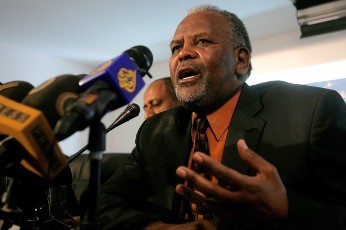Sudan’s ruling party meet to discuss post-oil shutdown economy
June 15, 2013 (KHARTOUM) – The economic sector at Sudan’s ruling National Congress Party’s (NCP) has held a meeting on Saturday to discuss the future of the oil industry in the country as well as the implications of Khartoum’s decision to halt flow of South Sudan’s oil through its territories.

The meeting has been shrouded in secrecy and was chaired by the head of the NCP’s economic sector Sabir Mohamed Al-Hassan and attended by the finance minister Ali Mahmoud Abdel-Rasool and the oil minister Awad Al-jaz, as well as several other economic experts.
An informed source told Sudan Tribune that the meeting discussed some measures to overcome the negative impact of the shutdown on Sudan’s economy and means to avoid any further repercussions if Khartoum failed to arrive at a common ground with Juba in the future.
Sources added that several remarks and suggestions to overcome the current crisis were made during the meeting which has lasted for several hours.
Sudan’s decision to stop oil flow was flanked by some degree of ambiguity.
At first, Bashir ordered immediate shutdown of oil flow, and said “The oil of South Sudan will not pass through Sudan ever again”.
But later the Sudanese government said oil flow will be gradually stopped within 60 days as such procedure requires to diminish its production before it is totally shut down.
South Sudan, for its part, acknowledged that it has received two letters informing it of the decision by the Sudanese government to suspend economic agreements and the use of its territory to export crude oil to the international markets.
The letters, obtained by Sudan Tribune, bear the signature of Al-Jazz and give the effective date for the shutdown of oil flows as 9 June.
But the South Sudanese minister of petroleum and mining, Stephen Dhieu, told reporters on Friday that “until this moment, the oil continues to flow. The production and flowing rate has not reduced. We have now produced and already sent seven million barrels to the facilities within the territory of Sudan.”
Minister Dau said an average of 185 barrels per day (bpd) continues to be pumped from blocks 3 and 7, revealing that oil from these blocks has already reached the maritime terminal at Port Sudan on the Red Sea.
Reuters said that diplomats doubt Sudan will actually close the two cross-border export pipelines because its economy has been suffering without South Sudan’s pipeline fees.
Oil used to be the main source for Sudan’s budget until southern secession in July 2011, when Khartoum lost 75 percent of its oil production and its status as oil exporter overnight.
(ST)
